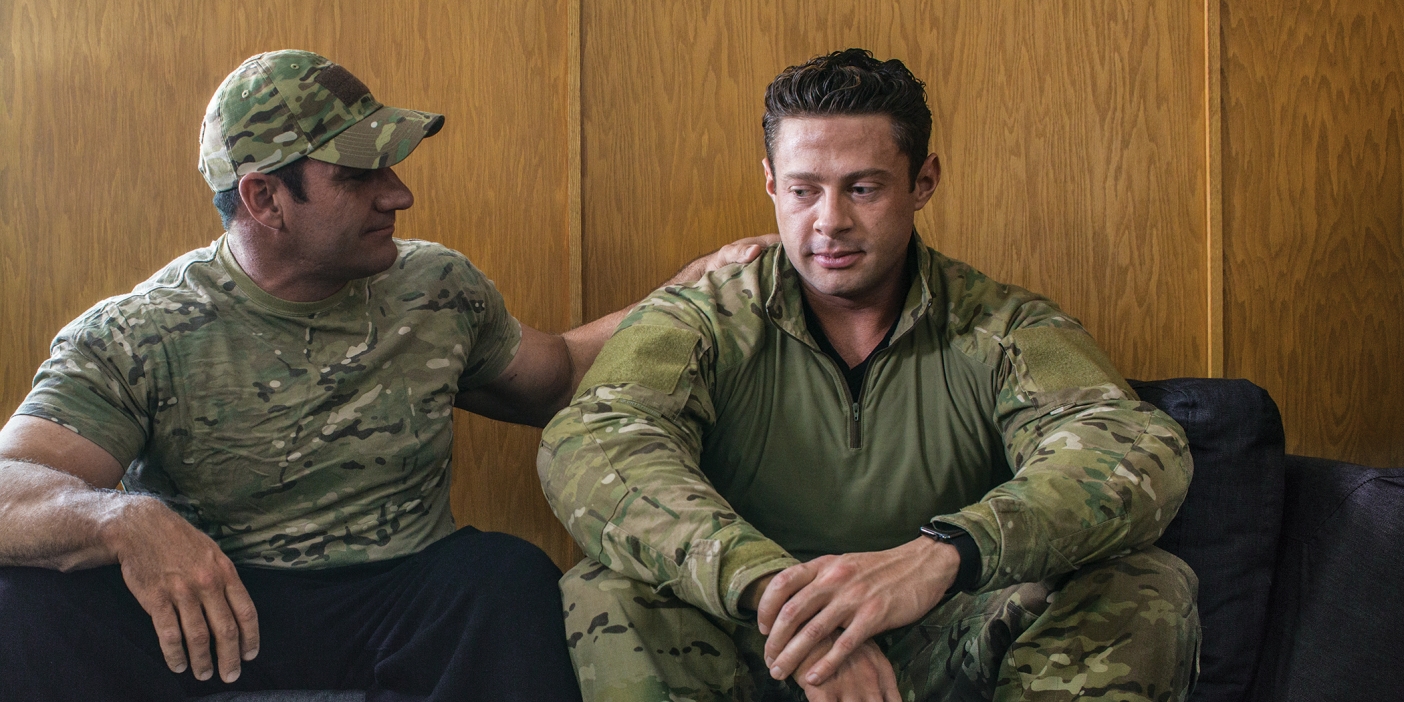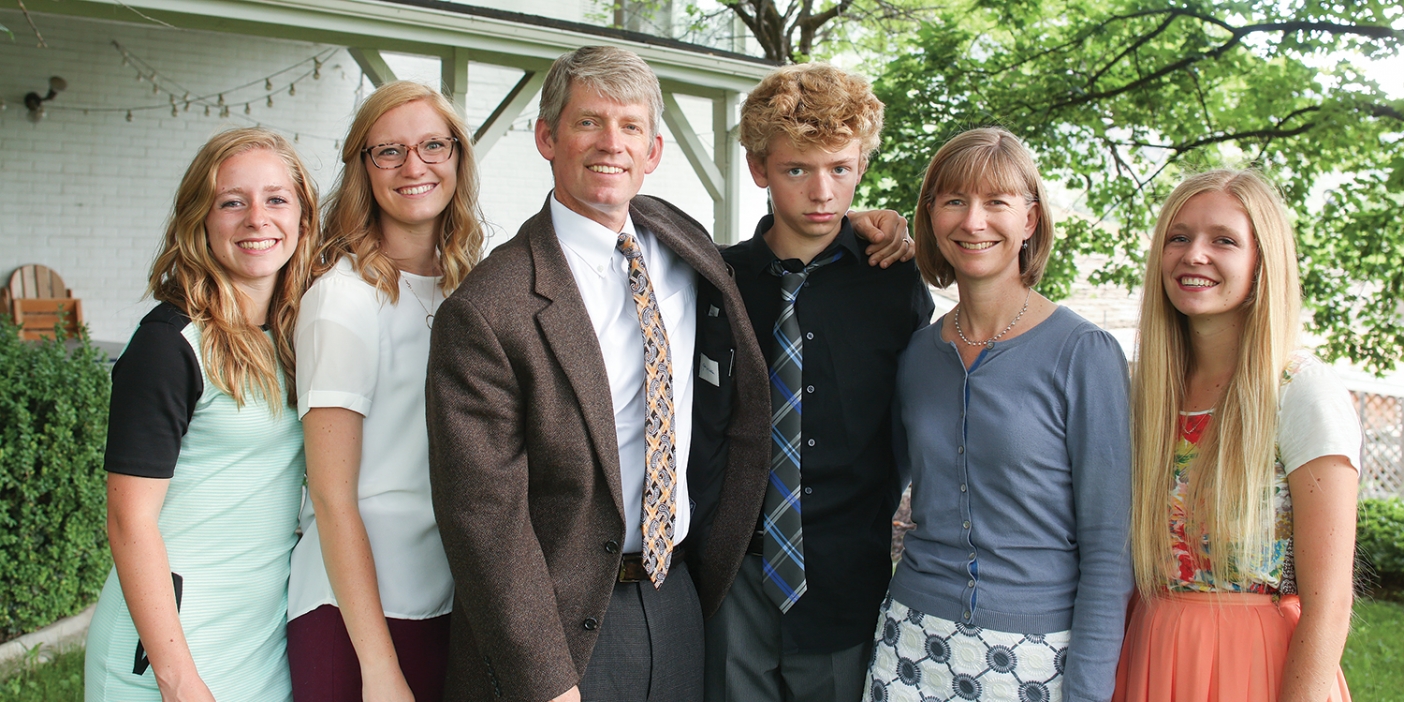When the Light Goes Out
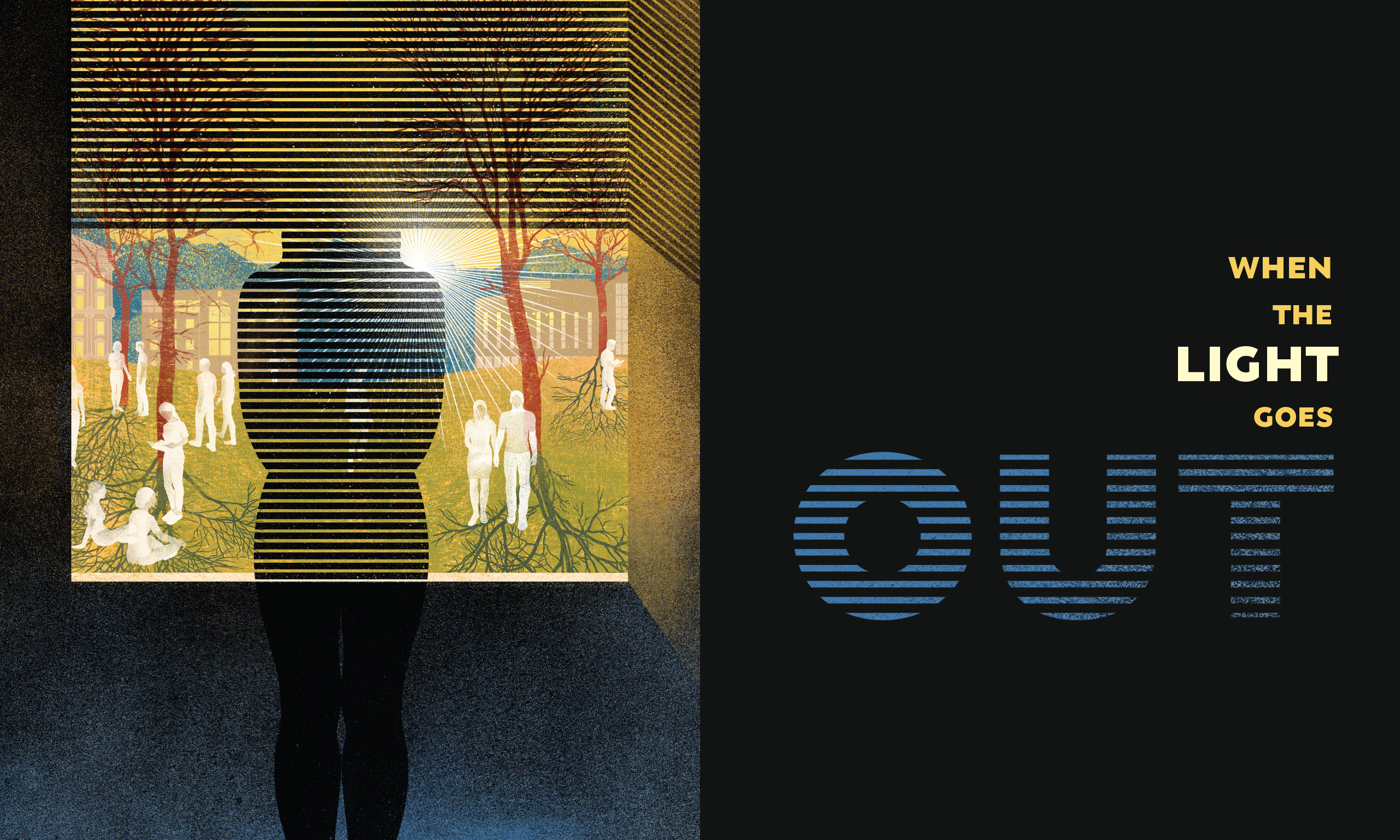
In a time when young adults seek help for anxiety and depression like never before, BYU mental-health experts offer advice—and hope.
By Lisa Ann Jackson Thomson (BA ’95, MA ’98) and Peter B. Gardner (BA ’98, MA ’04) in the Spring 2017 Issue
It was an early-summer day when Emily first arrived at BYU as a student. The sweet smell of fresh growth still hung in the air, and the heat of a Utah summer had not yet settled in. Emily had graduated from high school less than a week earlier, and she arrived at her dorm full of the typical blend of new-student emotions: excitement, nervousness, anxiety, optimism.
And she felt ready. She was used to a busy schedule. From seminary to high school to dance to homework, her days had been action packed. “I survived high school on very few hours of sleep and was always energetic and happy,” she recalls.
So sleeping the day away at college was a first sign that something was off. “I was tired all the time,” says Emily, who would return from classes to sleep for a couple of hours each afternoon.
By fall semester, her sleeping habits had become disruptive. “I would miss multiple classes each week. . . . I remember being sad and . . . alone. I didn’t know why I was feeling that way or how to deal with it,” she says. So she slept and she ate, gaining 30 pounds her first year of college.
Emily was experiencing depression. She had never had it before, and yet it took over her college experience almost immediately.
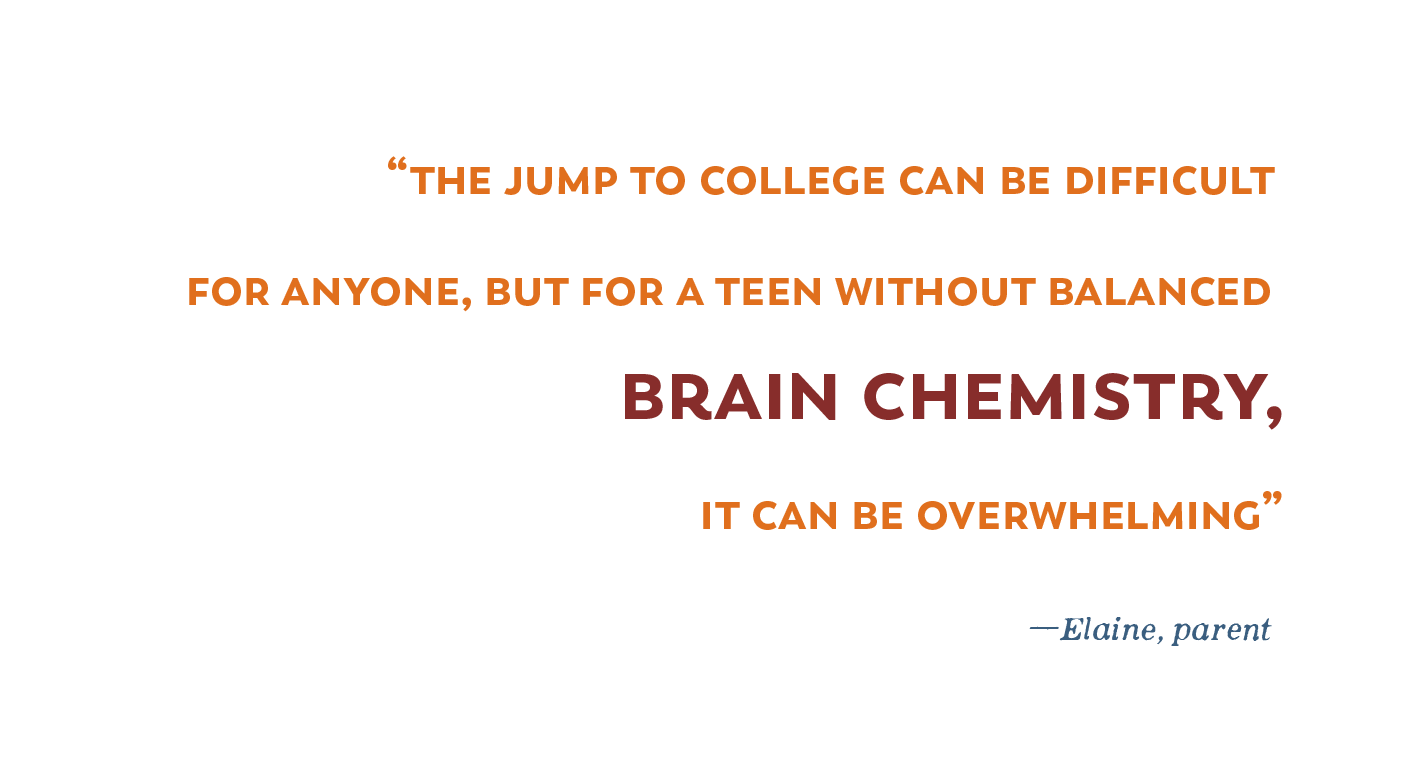
However alone Emily may have felt, her story is anything but unique among new college students, missionaries entering the field, and young adults otherwise transitioning into adulthood. According to a 2016 American College Health Association survey, almost 37 percent of college students reported feeling so depressed at some point during the previous year that they found it difficult to function. Comparing survey data from 2008 and 2016 reveals a 40 percent increase in students being diagnosed or treated for depression in the previous year and a whopping 70 percent increase in diagnosis of or treatment for anxiety.
This trend has held true for BYU, where data from the university’s Counseling and Psychological Services shows that the number of counseling sessions for students with mental-health concerns, including anxiety and depression, has grown two and a half times over the last 20 years.
The reason for this nationwide explosion of college-aged young adults seeking help for anxiety and depression remains unclear. While some have attributed increasing angst to the influence of new technologies—such as social media’s idealized portrayal of the good life—BYU experts say it’s too soon to understand all the reasons for the growing numbers.
Whatever the cause of this gloomy phenomenon, BYU researchers and therapists say there is great reason for hope. More people seeking help, they note, is a good thing, and it suggests decreasing stigma surrounding mental-health concerns. What’s more, they say, there have never been better resources for addressing these challenges—from strategies for building emotional strength and healthy coping methods to a host of professional services, including counseling and appropriate medical interventions when young adulthood becomes overwhelming.

A Perfect Storm
It should come as little surprise that mental-health conditions like anxiety and depression rear their ugly heads as young people embark on adulthood.
“In all societies . . . this is when various mental-health concerns start to be made manifest—in late adolescence to early adulthood,” says Steven A. Smith (BS ’81, MEd ’83), director of BYU’s Counseling and Career Center. While neurological and genetic influences play a role, just about all kids face increased demands and responsibilities as they grow up, and that can contribute to feelings of distress.
David W. Bush (BS ’77, MA ’78), a BYU alum who directs Utah State University’s Counseling and Psychological Services, notes that experiencing some anxiety and depression may be a normal sign of neurological development in young people: “There are some profound changes happening neurologically in the transition from childhood to young adulthood.”
Throw in decreased structure, rising expectations, and a penchant for perfectionism, and this phase of life can be the perfect storm.
Going Indie
“Emerging adulthood is unlike any other time in [our] lifespan,” says Larry J. Nelson (BS ’94, MS ’96), BYU professor of family life. “Think about all the structure in place for young children. . . . And then later in life, when we have responsibilities to spouses and employers, there is once again structure in our lives. But during emerging adulthood, there is no structure, there is no expectation or accountability for how we spend our time.”
Decreased structure coupled with increasing demands and responsibilities is a formula for vulnerability, especially for a student with an underlying mental-health challenge. “The jump to college can be difficult for anyone, but for a teen without balanced brain chemistry, it can be overwhelming,” says Elaine, whose daughter came to BYU with a diagnosis of bipolar disorder, which is related to depression and anxiety. “The everyday tasks of paying rent, getting food, doing laundry, dealing with roommates, attending classes, and meeting new people were just too much. She felt so incapable of handling it all that she was unable to handle any of it.”
And just as a young person’s responsibilities and decisions multiply, they also deepen in significance, with long-term implications for the future.
This transition can be especially daunting for Latter-day Saint young adults. In a culture that highly values education, missionary service, and family formation, the flood of new responsibilities and expectations can hit quickly. For instance, notes GeriLynn Price Vorkink (BS ’82, PhD ’10), director of BYU’s University Accessibility Center, with an emphasis on marriage in LDS culture, “students may view relationship issues as more dire, and these perceptions can be a factor in depression and anxiety.”
Perilous Perfectionism
Perfectionism is a term that surfaces again and again when talking about anxiety and depression with BYU experts. And that is little wonder at BYU, where the average incoming freshman excelled in high school sports and the performing arts, had a 3.85 GPA, and scored 29.2 on the ACT (in 2016, 54 applicants earned a perfect 36).
After gliding from achievement to achievement through adolescence, always near the top of their class, new BYU students often face a stark new reality when they step onto campus: they are suddenly right in the middle of the pack. And, in a much more challenging college environment, the common experience of a first bombed midterm or final-paper flop can be especially distressing.
Smith remembers a student who came to him in tears after grades were posted for a course he taught: “Finally she told me between sobs, ‘You gave me an A−.’”
“We may be the only school that lives by the scripture ‘Be ye therefore perfect’ (Matt. 5:48),” says Smith. “We want to follow that, but our students have this notion of perfection now, and parents inadvertently push that. It is in students’ best interest to let go of this self-defeating perfectionism and recognize that obtaining perfection is a lifelong process.”
Confronting personal limits can be particularly distressing for students who have come to believe that, with enough effort, they should be able to solve any problem—academic, social, or spiritual.
In a recent survey of 574 BYU students, ancient scripture professor and psychologist Daniel K Judd (MS ’85, PhD ’87) and his colleagues found a strong correlation between those who felt that their salvation was primarily dependent on their own efforts and those who experience anxiety, depression, and other mental-health problems. In contrast, Judd notes, “those who understood and embraced the principle of grace had dramatically lower scores.”
If You’re Unhappy and You Know It
Scrolling through the typical Instagram feed, it’s easy to imagine that the poster’s life is constantly hip, happening, and happy. Such superficial observations of their peers’ lives online and in person can give young people the impression that uninterrupted happiness is the norm.
“Students may have the unrealistic expectation that they should be happy all the time,” says Vorkink. “If they’re not, they feel like something is wrong with them. There may be this cultural need to present to others as if they are ‘okay,’ yet they don’t feel okay.”
On his mission and at BYU, Jordan became a master at appearing okay. “I went into my mission imagining myself being a great missionary. I would follow all the rules, I would be perfect, people would love me, and they would be converted to the gospel,” recalls Jordan. “That just wasn’t the reality.” The discrepancy, he says, resulted in a struggle with depression throughout his service.
Upon returning to BYU, Jordan’s emotional state spiraled downward, but he didn’t tell anyone what he was feeling. “I was very good at masking it,” he says. “People thought I was the happiest, nicest guy, but internally I tortured myself.”
He turned to pornography as a coping strategy, and he feared telling his parents how much he was suffering because he thought they would be ashamed of him. Jordan also confused the feelings he recognizes now as anxiety and depression as messages from God. “I interpreted those feelings as God’s disapproval of me: He didn’t want me to feel good about myself because He wasn’t happy with me,” he says.
It was during a drive with music blasting—something Jordan often did to cope—that he finally recognized he needed help. It was a turning point.
Jordan found a therapist through campus resources, and his physician prescribed medication. “To talk to a therapist who could explain the science behind what I was experiencing was so refreshing,” Jordan recalls. “[It] was the most weight-lifting, revelatory experience I had.”
Four Ways to Promote Health
With so many young people feeling burdened by anxiety and depression these days, what can be done? Plenty, both by the young adults themselves and those who love them, says Dean E. Barley (BS ’82, PhD ’93), director of BYU’s Comprehensive Clinic.
He recommends a two-pronged approach: First, he says, we can proactively “cultivate in the rising generation the best of what we know about how to succeed emotionally and mentally.” He adds, “It seems wiser to cultivate health along the way rather than to focus only on abating symptoms as they arise later.” But if and when those symptoms emerge, Barley says the companion strength—prong two—is to have the courage to get help.
Here are four areas to consider:
Build Autonomy
A parenting paradox, say BYU experts, is that one of the very best ways to help a child weather the storms of adolescence and young adulthood is not to shelter them when the rain and thunder come crashing down.
Sitting back and not acting—or at least not taking over—when a child is experiencing strain or stress or worry or fear can run directly counter to parental instincts to save and protect. But sometimes the best protection is inoculation—developing the emotional and mental resources to succeed through the experience of challenging situations.
The old maxim “Never do for the child what the child can do for himself” is especially true for helping young people develop confidence, competence, and emotional strength, says Bush. “If you jump in and try to rescue too soon, you send the message that you don’t trust them. And if you do too much for the child, you actually cripple them and undermine their confidence and ability to be self-reliant.”
![Pull Quote: "It [is] wiser to cultivate health along the way than to focus only on abating symptoms as they arise."](https://magazine.byu.edu/wp-content/uploads/2017/04/quote-2.png)
Nelson, who studies emerging adulthood, says that preparation should happen long before youth submit their college applications or mission papers. “If you are waiting until this time period to equip them with the skills to take these steps,” he says, “you are already too late.” He recommends giving kids “challenging but achievable tasks” from the earliest ages, shifting more and more toward autonomy as they mature. Once children have left home, it’s especially important for parents not to “helicopter,” swooping in to intervene each time their student has a complaint about a test score or doesn’t get into a desired program.
However, says Chad D. Jensen (BS ’04), a BYU assistant professor of psychology, climbing down from the chopper is not the same thing as being uninvolved. “Parents provide important emotional and practical support and should continue to attend to their child’s well-being,” he says.
Striking the right balance of emotional autonomy and support is an art, says Nelson. In a study of emerging adults, Nelson and his coauthors found that the young people whose parents both provided high levels of autonomy and offered abundant communication and support had the lowest levels of anxiety and depression.
The key, they say, is for parents to step out of the role of problem solvers for their youth and into the role of interested and willing resources—ready to provide counsel, support, and a listening ear as their children wage their own battles.

Harness Those Emotions
Stress and its attendant emotions—anxiety, fear, sadness—become common, if unwelcome, companions for young people as they navigate college admissions, wrestle with endless exams and research papers, face financial uncertainty, deal with romantic disappointments, or become acquainted with regular rejection as a missionary. While those feelings can motivate a youth to take action and resolve the stress, if not managed, they can also prove to be overwhelming, draining, and self-perpetuating.
Rather than dismissing difficult feelings, it’s important to “label and accept emotions” so they can be acted on says Barley. That ability to manage, act on, and bounce back from strains as they arise is called resilience and is a current focus in psychology. And, say the BYU experts, learning resilience is something that can be helpful for anyone dealing with stress—from the average college student to those who have a diagnosable disorder.
BYU experts say it begins with laying a strong foundation of health in areas that aren’t exactly the typical student’s forte: getting adequate sleep, taking time out for exercise, and eating a healthful diet (think more veggies and less caffeine).
As stresses arise, it’s natural for young people to try to replace the negative feelings with pleasurable ones. Unfortunately, Smith says, many of the common go-to methods for young people can be unproductive and even harmful. Some turn to pornography or excessive video-gaming. Others may binge on anything from potato chips to Netflix. While this destructive sort of “self-medicating” may temporarily allay negative emotions, it ultimately creates more problems than it resolves.
Much better, say experts, is for young people to counter stress with their own unique set of healthy coping strategies. Those might include shooting hoops, having a heart-to-heart with a friend or a parent, keeping a gratitude journal, or finding someone to serve. And nearly everyone does better when they avoid isolation and foster social connections.
Young people can also learn to adjust their physiological response to stress. Strategies range from using deep, abdominal breathing to learning to relax one’s muscles to replacing negative self-talk with more productive internal conversations. Smith says thought processes that involve words like should, ought to, must, or have to (as in “I have to get into medical school or I’ll let everyone down”) are rarely healthy and represent a rigid, perfectionist orientation. He says, “People who are resilient tend to have more flexibility in their thinking” (“I hope I get into medical school, and I’ll do my best. But if that doesn’t work out, I’ll succeed elsewhere.”).
The good news, Smith says, is that such strategies really do help reduce stress in just about anyone who is willing to commit to them and practice.
Make It About Growth
Acing a test, having a baptism, getting engaged: it’s natural that young people tend to derive happiness from those most visible indicators of success. But what happens when the student is in over her head academically, baptisms are few and far between, or marriage comes much slower than anticipated—or not at all?
In an academic realm, “parents need to prepare their students that they are not necessarily going to get straight As—and it’s okay,” says Smith. It’s about setting reasonable expectations. “You are saying, ‘Work hard and do the very best you can. Get the best grades you can.’”
If this phase of life is only about the end achievements, young people can miss the joy of the journey. In his own education, Smith says some of his most meaningful experiences—including a delightful children’s lit class he took to fulfill a general-ed requirement—had little to do with his ultimate goal of attending graduate school. “Learning is a joyful and a wonderful experience,” he says. “Students sort of forget that in their quest to get an A.”
Nelson agrees: “This is a great time to explore and get to do things,” he says. “It’s about growth, not achievement. As students get away from an accomplishment mentality (‘I have to get an A or make Women’s Chorus’) and move to a growth mentality, it will be about learning and improving.” He encourages students to apply for internships, go on study abroad, try out for a play, and generally focus more on becoming than on grades and other external markers of success.
No Shame in Getting Help
Because anxiety and depression stem from a mix of physical, behavioral, and situational factors, individuals can struggle even when they are “doing all the right things.” And so when life gets overwhelming for young people, neither they nor their parents should feel any shame or guilt in seeking professional help.
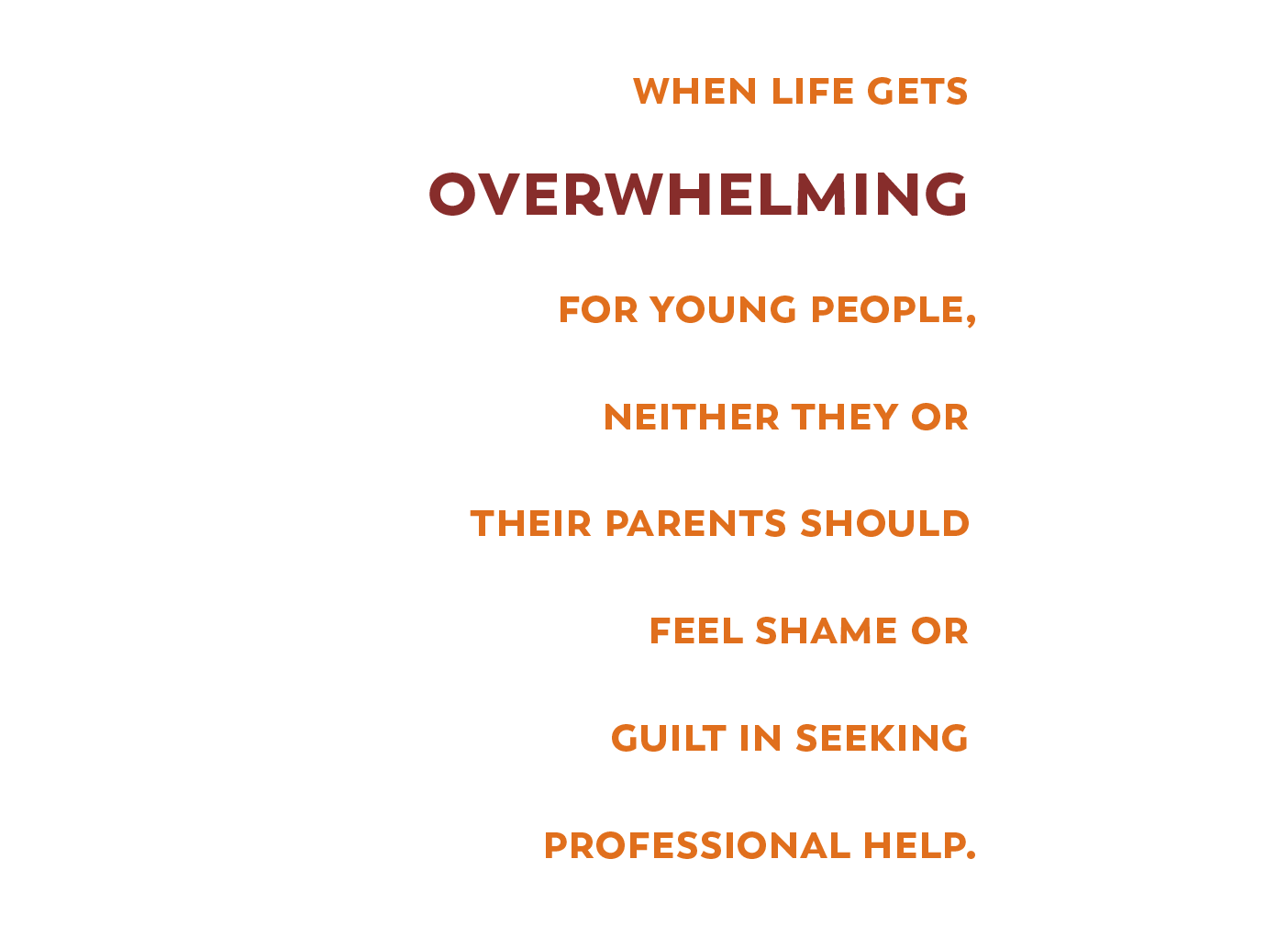
“It is not a reflection on your parenting, and it’s not a reflection on who your child is,” says Nicole, whose BYU freshman son, Kyle, has dealt with anxiety since the ninth grade. “It’s just one of those earthly things.”
Nicole’s best advice for handling a persistent challenge with anxiety or depression: “Get professional help.” She adds that it “takes a lot of prayer and a lot of research in deciding what’s best for your child. But don’t hesitate to do it.”
As Kyle has dealt with anxiety, he and his parents have worked closely with therapists and physicians to help manage his symptoms. And together they have modified how he steps into adulthood. Along with finding summer work in a safe environment away from home after high school, Nicole says, “we highly encouraged him to get at least a year of college behind him before going on a mission.” When school began, Kyle’s parents encouraged him to move out, even though the family lives close to BYU.
It’s all part of a comprehensive approach to Kyle’s challenge with anxiety, an approach that involves therapeutic and medicinal help, behavioral strategies, and deliberate steps toward building independence and self-management.
Feeling Better
While the rising number of college-age young adults seeking help for anxiety and depression can be alarming, not all the trends are discouraging. It turns out that young adults are willing to get help like never before. “Millennials are really ‘help seekers,’” says Smith. “They don’t hesitate to go out and try to find something that’s going to help them with their studies or to feel better.”
And with some combination of behavioral modifications, therapy, medication, and time, just about anyone with anxiety or depression can, in fact, improve their mental health and achieve their goals.
For Jordan it came down to finding the right therapist and medication and rethinking his approach to college. He was in school full-time, working part-time, and trying to maintain a scholarship. It was a frightening leap, but Jordan decided to become a part-time student and give up his scholarship.
“Once I realized, ‘Hey, I’m a part-time student, I don’t have a scholarship anymore, and I’m still alive,’ that was really key to me coping and finishing school,” he says. He graduated in 2015 with a degree in public relations.
It took Emily eight years to finish her degree in early-childhood education. After taking some time off to work with therapists and fine-tune medication, she worked with an academic counselor to schedule classes at times that made sleeping through them less tempting.
“This second experience at BYU was completely different, being depression free,” she says.
As the stigma surrounding mental-health concerns decreases, Barley says such successes are becoming increasingly common. And that’s important not just for a young person’s successful completion of college or a mission but for successfully moving forward in life.
“Young adults are in the vector years, in which trajectories are chosen that could affect the rest of their life,” he says. “Patterns of encountering difficulties with successful resolution engrain strengths in [young people] that are essential as they pass through life.”
Note: Names of students and parents in this article have been changed.
Lisa Ann Thomson is a freelance writer who lives in Salt Lake City with her husband and three children. Peter Gardner is the editor of BYU Magazine.
Feedback: Send comments on this article to magazine@byu.edu.


